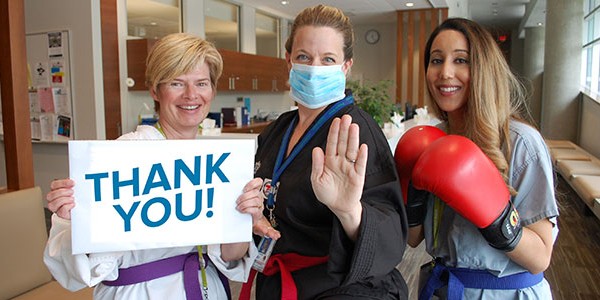Flu season ends with your help
The flu season is officially over, and as such the Influenza Control Program Policy is no longer in effect as of midnight Friday, April 15.
Influenza activity has declined in B.C., and the Provincial Health Officer has announced the end of the flu policy application period. This means that staff, physicians and volunteers who have not received the influenza vaccine are no longer expected to wear masks in patient care areas.
Policy compliance rates
16,828 VCH staff (89.5 per cent) reported that they were immunized or wore a mask for the 2015/2016 flu season. Of staff who reported, 90 per cent were immunized, while the remaining wore a mask.
Thank you for doing your part
Thank you to all of you who participated in this important patient safety initiative, and a special thank you to our 225 Peer Nurse Immunizers across VCH for providing a convenient opportunity for 4,675 staff to be immunized at work.
Our annual flu campaign would not be possible without your continued participation, initiative and support.
The policy & reporting apply to everyone
Just a reminder, the Health Care Worker Influenza Protection Policy, and self-reporting, applies to all VCH staff, including all casuals and excluded staff; physicians, volunteers and contractors.
Viruses are ever-present
Although we’re past the peak of influenza activity, influenza and other respiratory viruses are still present in our communities at this time. Consider the other important ways you can protect yourself and your patients, including proper hand hygiene, proper sneezing and coughing etiquette, and staying home when ill. The Staff Influenza Outbreak Policy continues to apply at facilities experiencing outbreaks.
Again, thank you for your ongoing commitment to protecting our patients from the flu.



thomas james turner
hhahaha…ya ok i got the shot but now i got the flu in april…mmmmmgrrrrrr, so ,,ya???r so is it really effective????or is this some pharmaceutical company push???? $$$$
Tiffany Akins
Vaccine effectiveness will vary from year to year, and the historically low effectiveness measured in 2014-15 does not predict how effective the vaccine will be in subsequent seasons. For instance, for the 2015-16 season, Canadian investigators have already shown substantially better effectiveness, at more than 60% effective at preventing against the A (H1N1) strain that has dominated during 2015-16.
When people get the flu and they’ve had the flu shot, like you, they typically are sick for fewer days and have less symptoms compared to people who are not immunized.